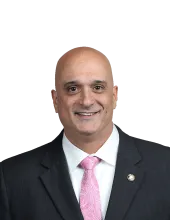
Protecting our elders.
Nursing home abuse causes deep emotional and physical harm. We fight for justice and accountability.
Start Your ClaimThe attorney shown above may not be licensed in your state. To find an attorney licensed in your area, please visit our attorney page.

The attorney shown above may not be licensed in your state. To find an attorney licensed in your area, please visit our attorney page.
Meet Our Nursing Home Abuse Attorneys
From uncovering evidence to pursuing accountability, our attorneys handle every detail so you can focus on supporting your loved one.
The attorneys shown in these photos may not be licensed in your state. To find an attorney licensed in your area, please visit our attorney page.
Our Results
Results may vary depending on your particular facts and legal circumstances.
Ways We Can Help
Nursing Home Abuse
Assisted Living Abuse
Hospital Abuse
In-Home Care Abuse
Memory Care Unit Abuse
Adult Day Care Abuse
In Their Words
Based on select nationwide reviews.
Nursing home abuse cases need three things.
Evidence of harm or damages
Negligence or misconduct
Causal link between negligence and harm
A Guide to Nursing Home Abuse
Learn how to recognize signs of nursing home abuse, protect your loved ones, and take legal action to hold negligent facilities accountable.
Fighting For the People
Backed by America’s Largest Injury Law Firm.
$25 Billion
Recovered for clients
nationwide700,000+
Clients and families
served1,000+
Attorneys across
the country1
Click may change your life

The attorney featured above is licensed in Florida. For a full list of attorneys in your state please visit our attorney page.
Results may vary depending on your particular facts and legal circumstances.
Nursing Home Injury Types
Bedsores
Fall-Related Injuries
Spinal Injuries
Burns
Medication Injuries
Head Injuries
Learn More
Injured and not sure what to do next?
We'll guide you through everything you need to know.
Get answers to commonly asked questions about our legal services and learn how we may assist you with your case.
How do I know if my loved one or I have a nursing home abuse claim?
Nursing home abuse can lead to devastating physical, emotional, and financial harm for elderly residents. If you suspect that a loved one is suffering from neglect or abuse in a nursing facility, understanding your legal rights is crucial. To pursue a claim, you must establish key legal elements that prove misconduct or negligence. Here’s what you need to demonstrate:
Duty of Care
Nursing homes and their staff have a legal duty to provide residents with adequate and appropriate healthcare, consistent with federal and state law and regulations, and a safe, clean, and healthy living environment. This includes proper medical care, adequate supervision, and protection from abuse or neglect.
Breach of Duty
To have a valid claim, you must show that the nursing home or its staff failed to meet this duty of care. Examples of breaches include:
- Failure to provide proper medical attention
- Neglect leading to malnutrition, dehydration, or bedsores
- Physical, emotional, or sexual abuse by staff or other residents
- Medication errors or overmedication
- Unsanitary living conditions
- Lack of supervision leading to falls or wandering/elopement
Causation
It’s not enough to prove negligence—you must also establish that the nursing home’s failure to uphold its duty directly caused harm to your loved one. Evidence such as medical records, witness statements, photographs of injuries, and expert testimony can help prove this link.
Damages
To pursue compensation, you must show that the abuse or neglect resulted in actual harm. This can include:
- Medical expenses (hospitalization, rehabilitation, ongoing care)
- Emotional distress and psychological trauma
- Pain and suffering
- Wrongful death, in cases of fatal neglect or abuse
If you suspect nursing home abuse, it’s essential to take action. A nursing home abuse attorney can review your case, help gather evidence, and fight for justice on behalf of your loved one.
What should I do if I suspect nursing home abuse?
If you suspect a loved one is experiencing abuse, it is essential to act quickly to protect them.
Document the Abuse
Keep a detailed record of:
- Visible injuries or changes in health
- Behavioral shifts
- Conversations with staff regarding the suspected abuse
Contact Authorities
Immediately report your concerns to:
- The nursing home administrator
- Local adult protective services (APS)
- Law enforcement if there is immediate danger
Seek Medical Attention
Ensure the victim receives medical care for any physical or psychological harm. Medical professionals can also document injuries, providing vital evidence.
Contact Morgan & Morgan
Our experienced elder abuse attorneys can assess your case and advise you on legal options, including filing a lawsuit to hold the nursing home accountable.
What should I do if I suspect elder abuse?
If you suspect elder abuse, you should take immediate action to protect your loved one and preserve evidence. Take photos, gather medical records, and keep detailed notes on any signs or incidents of abuse.
When you have collected all relevant evidence, file a complaint with the facility's management or contact your local Adult Protective Services (APS).
In the meantime, you should also seek medical attention for your loved one. Ensure that they get any necessary treatment for physical or emotional injuries.
At any stage of this process, you can contact Morgan & Morgan. One of our elder abuse attorneys can assess the situation, advise you on the best course of action, and help protect your loved one’s rights.
How long do I have to file a nursing home abuse claim?
If you suspect that a loved one has suffered abuse or neglect in a nursing home, it's crucial to understand the time limits for taking legal action. The timeframe for filing a claim—known as the statute of limitations—varies by state, typically ranging from one to several years from the date of the abuse or discovery of harm. Failing to file within this period may result in losing the right to seek compensation.
Exceptions to the Statute of Limitations
In some cases, the harm caused by nursing home abuse may not be immediately apparent. The discovery rule allows the statute of limitations to begin when the abuse or injury is discovered—or reasonably should have been discovered—rather than when it occurred. This can be particularly relevant in cases involving:
- Hidden neglect (such as malnutrition or untreated infections)
- Cognitive impairments (when victims are unable to report abuse)
- Financial exploitation (when fraudulent activities are uncovered later)
Why Acting Quickly Matters
Even if the statute of limitations allows for a longer window, filing a claim as soon as possible is critical. Over time:
- Key evidence may be lost or destroyed
- Witness memories may fade
- Medical records and documentation may become harder to obtain
Additionally, some states require early reporting of abuse to qualify for legal action or certain benefits, making prompt action even more essential.
Consult a Nursing Home Abuse Attorney
Because statutes of limitations and exceptions can be complex, consulting an attorney as soon as you suspect abuse is the best way to protect your loved one’s rights. A lawyer can help determine the exact deadline for your case, gather necessary evidence, and take legal action before time runs out.
How long does it take to settle a nursing home abuse lawsuit?
The timeline varies depending on the complexity of the case, the amount of evidence, and whether the case goes to trial. Some cases may resolve in months, while others take years.
Nursing home abuse is a grave issue requiring immediate action, and the best way to understand what you need and what a lawsuit timeline may look like is to speak to a qualified and experienced attorney.
If you suspect abuse, contact Morgan & Morgan today to discuss your case and explore your legal options. Together, we can fight for accountability and ensure the safety and dignity of nursing home residents.
Why should I hire Morgan & Morgan?
At Morgan & Morgan, our team of experienced nursing home abuse attorneys has successfully represented countless clients in similar situations, securing millions in compensation. As the largest personal injury law firm in the country with over 1,000 lawyers nationwide, we have the resources, knowledge, and dedication to fight for your rights.
We work on a contingency fee basis, meaning you won’t have to pay unless we win your case. Morgan & Morgan believes justice should be accessible to all, so our motto is the Fee Is Free™—you only pay if we win.
We take pride in holding negligent nursing homes accountable for the harm they’ve caused to residents. Your loved one shouldn’t have to suffer due to neglect or abuse. Contact Morgan & Morgan today for a free case evaluation to explore your legal options.
How much does it cost to hire Morgan & Morgan?
Morgan & Morgan’s nursing home abuse lawyers work on a contingency fee basis, meaning that there are no upfront fees or expenses until your case comes to a successful conclusion. That’s right—the Fee Is Free™, and you only pay if we win.
Our fee is a percentage of the settlement or verdict amount, ensuring we are motivated to achieve the best possible outcome for you.
What kind of damages can I claim in a nursing home abuse case?
If your loved one has suffered abuse or neglect in a nursing home, they may be entitled to compensation for the physical, emotional, and financial harm they have endured. The types of damages available in a nursing home abuse claim depend on the severity of the mistreatment and its impact on the victim’s well-being. Here’s a breakdown of the different types of damages that may be recoverable:
Medical Expenses
When nursing home abuse results in injuries or health complications, you may be able to claim compensation for medical costs, including:
- Emergency care and hospital stays
- Doctor’s visits and specialist care
- Prescription medications and medical equipment
- Rehabilitation and physical therapy for recovery
- Long-term medical care required due to neglect or abuse-related injuries
Pain and Suffering
Nursing home abuse can cause severe physical pain and emotional distress. These damages cover:
- Physical pain: Compensation for injuries such as bedsores, fractures, or infections caused by neglect
- Emotional suffering: Anxiety, depression, PTSD, or loss of enjoyment of life due to the abuse or neglect
Mental and Emotional Distress
Elderly residents who experience abuse often suffer lasting psychological effects. Compensation may be available for:
- Emotional trauma caused by verbal, physical, or emotional abuse
- Fear, anxiety, and loss of trust in caregivers
- Mental health treatment or counseling costs
Financial Exploitation and Fraud Losses
If your loved one was a victim of financial abuse in a nursing home, you may be able to recover:
- Stolen or misused funds
- Unauthorized credit card charges or bank withdrawals
- Fraudulent changes to wills, trusts, or power of attorney
- Property theft
Wrongful Death Damages
If nursing home abuse or neglect leads to the death of a loved one, surviving family members may file a wrongful death claim for:
- Funeral and burial expenses
- Medical bills incurred before passing
- Loss of companionship and emotional support
- Loss of financial support the deceased would have provided
Punitive Damages
In cases of extreme negligence or intentional abuse, the court may award punitive damages to punish the facility and prevent future misconduct. These are often granted in cases involving:
- Severe neglect leading to preventable death
- Intentional physical, emotional, or sexual abuse
- Knowingly violating nursing home safety regulations
Relocation Costs
If the abuse or neglect requires your loved one to be moved to a different facility, you may be able to recover:
- Moving expenses
- New facility admission fees
- Increased care costs if a higher level of care is now required
Loss of Dignity and Independence
Elderly individuals who suffer abuse may experience a diminished quality of life, losing their ability to care for themselves or engage in activities they once enjoyed. Compensation may be available for:
- Loss of autonomy due to injuries or emotional trauma
- Inability to participate in social activities or hobbies
- How to Pursue a Nursing Home Abuse Claim
If you suspect that your loved one has suffered abuse or neglect in a nursing home, taking legal action as soon as possible is critical. An experienced nursing home abuse attorney can help gather evidence, document damages, and fight for the compensation your loved one deserves. Contact Morgan & Morgan today for a free case evaluation.
Do I have to pay for a consultation with a nursing home abuse lawyer?
No. Consultations at Morgan & Morgan are completely free. We believe everyone deserves access to legal advice, regardless of their financial situation.
Hiring one of our lawyers is easy, and you can get started in minutes with a free case evaluation on our site or by phone.
Who will be on my elder abuse case team?
When you hire Morgan & Morgan, you don’t just hire a lawyer, you hire the largest personal injury law firm in the country with an army of over 1,000 lawyers and offices in all 50 states and Washington, D.C.
Your case will be handled by a dedicated team of professionals, including personal injury lawyers, paralegals, and support staff. You will be assigned a care team that includes a primary attorney who will oversee your case and ensure you receive personalized attention throughout the process.
When do I meet with my nursing home abuse lawyer?
After your initial consultation, your care team will schedule regular meetings to discuss your case, provide updates, and prepare you for any upcoming proceedings. We are committed to maintaining open lines of communication and keeping you informed every step of the way.
These meetings can be handled in person, virtually, and by phone, depending on your case’s requirements and your ability to do so.
What are common types of elder abuse in nursing homes?
Elder abuse in nursing homes is a deeply troubling issue, affecting some of society's most vulnerable individuals. Abuse can manifest in various forms, each carrying severe consequences for victims.
Physical Abuse
Physical abuse involves the intentional use of force against a resident, resulting in harm, pain, or injury. This can include hitting, slapping, kicking, or improper use of restraints. Signs of physical abuse may include:
- Unexplained bruises, cuts, or burns
- Frequent injuries without satisfactory explanations
- Sudden changes in behavior or fearfulness around specific staff members
Emotional Abuse
Emotional abuse entails verbal or non-verbal acts that inflict psychological distress. Perpetrators may yell, demean, isolate, or manipulate residents. Indicators of emotional abuse can include:
- Withdrawal from social interactions
- Sudden mood swings or depression
- Fearful or anxious behavior around caregivers
Financial Exploitation
Financial exploitation occurs when someone unlawfully or improperly uses a resident’s money, assets, or property. In a nursing home setting, this might involve:
- Unauthorized withdrawals from bank accounts
- Forged checks
- Coercion into signing financial documents Signs include missing funds, unpaid bills, or unexplained changes to wills or financial accounts.
Neglect
Neglect happens when caregivers fail to provide necessary care, resulting in harm or discomfort. Common examples include:
- Lack of assistance with personal hygiene
- Malnutrition or dehydration
- Untreated medical conditions or infections Signs of neglect often include poor hygiene, bedsores, or a general decline in health.
Sexual Abuse
Sexual abuse involves any non-consensual sexual contact or activity. Given the vulnerability of many nursing home residents, sexual abuse can be particularly heinous. Signs might include:
- Unexplained genital injuries or infections
- Behavioral changes, such as withdrawal or fearfulness
- Reluctance to be touched or examined
How do I file a nursing home abuse lawsuit?
Filing a nursing home abuse lawsuit can seem daunting, but it is a critical step in seeking justice and preventing further harm.
Step 1: Recognize the Abuse
Identify signs of abuse and document them thoroughly. This includes taking photographs of injuries, keeping records of medical conditions, and noting changes in behavior.
Step 2: Report the Abuse
File a complaint with your state’s regulatory body overseeing nursing homes, such as the Department of Health. Reporting ensures the abuse is formally documented and may prompt an investigation.
Step 3: Gather Evidence
Collect any evidence supporting your claim, such as:
- Medical records
- Witness statements from staff or other residents
- Financial statements in cases of exploitation
Step 4: Contact Morgan & Morgan
An elder abuse attorney can guide you through the complexities of filing a lawsuit. They can:
- Help file the necessary paperwork
- Negotiate with nursing home representatives
- Represent your case in court, if needed
Step 5: File the Lawsuit
Your attorney will formally file a complaint against the nursing home, outlining the abuse, the evidence, and the desired compensation for damages.
What are common defenses used by nursing homes in abuse cases?
When faced with allegations of abuse, nursing homes often mount defenses to avoid liability. Understanding these strategies can help you and your attorney counter them effectively.
Understaffing
Nursing homes may claim that inadequate staffing levels led to neglect or lapses in care. However, this defense highlights systemic issues, and facilities can still be held accountable for failing to meet minimum care standards.
Resident Behavior
Some facilities argue that a resident’s own actions or medical conditions contributed to their injuries. For example, they may claim that falls occurred due to resident non-compliance rather than inadequate supervision.
Lack of Evidence
Nursing homes might challenge the validity of evidence, arguing that injuries or conditions were not directly caused by abuse. Thorough documentation and expert testimony can counter these claims.
Waivers of Liability
Some nursing homes include arbitration clauses in their contracts, limiting residents’ ability to file lawsuits. An experienced attorney can challenge the enforceability of such clauses.
What is the long-term impact of elder abuse?
The consequences of elder abuse extend far beyond the immediate harm, impacting victims and their families for years to come.
Physical Consequences
Abuse can exacerbate existing health conditions or lead to:
- Chronic pain
- Disabilities
- Premature death
Emotional and Psychological Impact
Victims often experience lasting mental health issues, such as:
- Depression
- Anxiety
- Post-traumatic stress disorder (PTSD)
Financial Repercussions
Families may face:
- Medical expenses for treatment
- Legal fees
- Loss of financial assets due to exploitation
Family Burden
The emotional toll on family members can include guilt, stress, and strained relationships, especially if they were responsible for choosing the facility.
How can I prove that my loved one is experiencing nursing home abuse or neglect?
Evidence is critical. Gather medical records, photographs of injuries, financial statements (if relevant), and witness testimonies.
When you consult with an experienced attorney, they can assist you in the gathering of evidence and what key elements may help your specific case.
What are the legal responsibilities of a nursing home to protect its residents from abuse?
Nursing homes have a legal and ethical responsibility to provide a safe, respectful, and dignified environment for their residents. Their legal responsibilities to protect residents from abuse stem from federal and state laws and regulations. Here’s an overview:
Federal Legal Responsibilities
The Nursing Home Reform Act of 1987 (part of the Omnibus Budget Reconciliation Act) sets the national standard for nursing home care. Key responsibilities include:
Ensuring Safety and Freedom from Abuse
Nursing homes must ensure residents are free from abuse, neglect, exploitation, and mistreatment.
Providing Adequate Supervision and Staffing
Nursing homes must employ sufficient, well-trained staff to prevent abuse and neglect.
Reporting and Investigating Abuse
Federal regulations require nursing homes to report any allegations of abuse to the appropriate state authorities and conduct thorough internal investigations.
Resident Rights
Facilities must respect residents' rights, including their right to dignity, respect, and freedom from abuse.
State Legal Responsibilities
States often have additional laws and regulations that nursing homes must follow, including:
Licensing and Certification Requirements
Nursing homes must comply with state-specific licensing standards to operate, which typically include safety protocols.
Mandatory Reporting
Staff are often required to report suspected abuse to state agencies, such as adult protective services (APS) or the long-term care ombudsman.
Background Checks on Staff
States may require criminal background checks for employees to prevent hiring individuals with a history of abusive behavior.
Preventive Responsibilities
Nursing homes must implement proactive measures to protect residents, such as:
Training Staff
Regular training on recognizing and preventing abuse, handling difficult situations, and responding to emergencies.
Developing Abuse Prevention Policies
Written policies and procedures for identifying, reporting, and addressing abuse should be established and followed.
Monitoring and Surveillance
Utilizing cameras, regular staff evaluations, and supervision to deter and detect abuse.
Legal Accountability
If a nursing home fails to fulfill these responsibilities, it may face legal consequences, such as:
Civil Liability
Nursing homes can be sued for damages in cases of abuse, neglect, or wrongful death.
Criminal Charges
Individuals or the facility may face criminal prosecution for abusive or neglectful behavior.
Revocation of Licenses and Penalties
Regulatory agencies may impose fines, revoke licenses, or suspend operations for failing to meet legal obligations.
Can I file a lawsuit against a nursing home for abuse even if the victim is non-verbal or has dementia?
Yes. An attorney can help gather evidence and build a case, even if the victim cannot communicate their experiences directly. As mentioned above, there are numerous forms of evidence that can actually be more important to your case than mere testimony by the victim, such as photographs of injuries, bank statements, other witnesses' information, and other forms of proof.
How can I prevent nursing home abuse?
Preventing nursing home abuse starts with choosing a reputable facility and staying actively involved in your loved one’s care. Here are some key steps to help protect them:
- Choose a trusted facility with a strong safety record and positive reviews.
- Visit regularly at different times to observe staff interactions and overall living conditions.
- Communicate frequently with your loved one and encourage open discussions about their care.
- Watch for signs of abuse, such as:
- Unexplained injuries (bruises, cuts, bedsores)
- Sudden emotional or behavioral changes
- Poor hygiene or signs of neglect
- Build a relationship with caregivers and ask about medical care, daily routines, and staff practices.
- Report any concerns immediately to:
- Facility administrators
- State agencies (Adult Protective Services)
- A nursing home abuse attorney if legal action is necessary
It’s critical to be an advocate for your loved one. Staying involved and taking proactive steps can help ensure your loved one receives the care, respect, and dignity they deserve. If you see something you don’t like, say something. Be sure to document who you spoke to and what their response was. Taking these proactive steps can help ensure that your loved one is in good hands.
What happens if the nursing home retaliates against my loved one after we file a complaint?
Retaliation against a resident for filing a complaint or lawsuit is illegal and a serious violation of both state and federal laws. If you suspect retaliation, such as mistreatment, neglect, or threats against your loved one after a complaint is made, here’s what you can do:
- Document Everything: Keep detailed records of any suspicious actions, including dates, times, and descriptions of incidents. Take photos, collect medical records, and gather statements from witnesses.
- Report Retaliation Immediately: File a report with your state’s nursing home regulatory agency. You can also contact the local ombudsman for long-term care facilities to investigate retaliation claims.
- Notify Your Attorney: Inform your lawyer of the retaliation so they can take legal action to protect your loved one. This may include filing for an injunction to prevent further retaliation or amending your lawsuit to include retaliation claims.
- Consider Relocation: If the safety of your loved one is at risk, work with your attorney to explore options for moving them to another facility.
Retaliation often strengthens a case against the nursing home, as it demonstrates a pattern of behavior that further supports claims of negligence or abuse. Morgan & Morgan’s skilled attorneys can help ensure your loved one is protected and hold the nursing home accountable for any retaliatory actions.
How can a Morgan & Morgan nursing home abuse lawyer help me?
A Morgan & Morgan nursing home abuse lawyer can help protect your loved one’s rights and hold negligent facilities accountable. With extensive experience in elder abuse cases, our attorneys understand state laws and regulations governing nursing homes and can guide you through the legal process.
We conduct thorough investigations, gathering evidence such as medical records, witness statements, and facility reports to build a strong case. Our team also handles all communication with nursing homes and insurance companies to ensure your loved one receives fair compensation for medical expenses, pain and suffering, and other damages.
If a fair settlement isn’t reached, we are prepared to take the case to court. And with our contingency fee model, you don’t pay unless we win. Contact Morgan & Morgan today for a free case evaluation.












